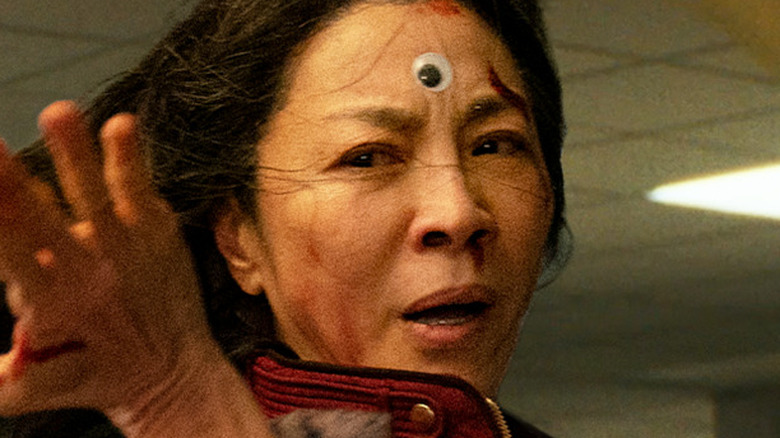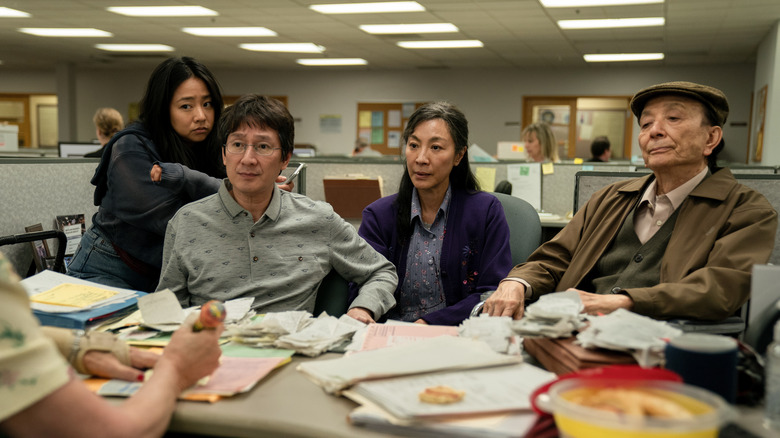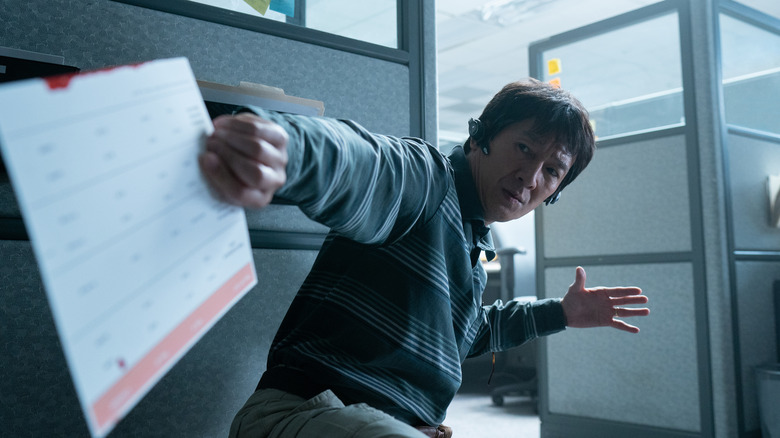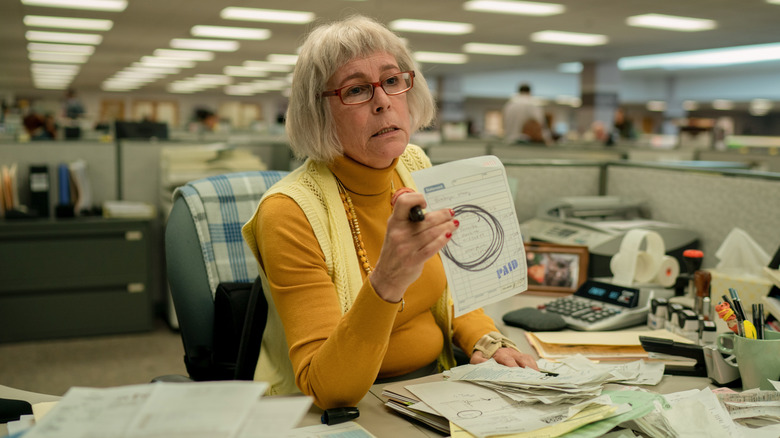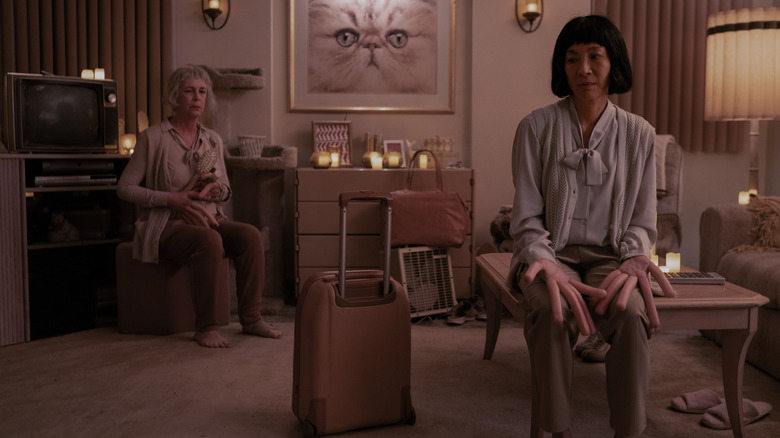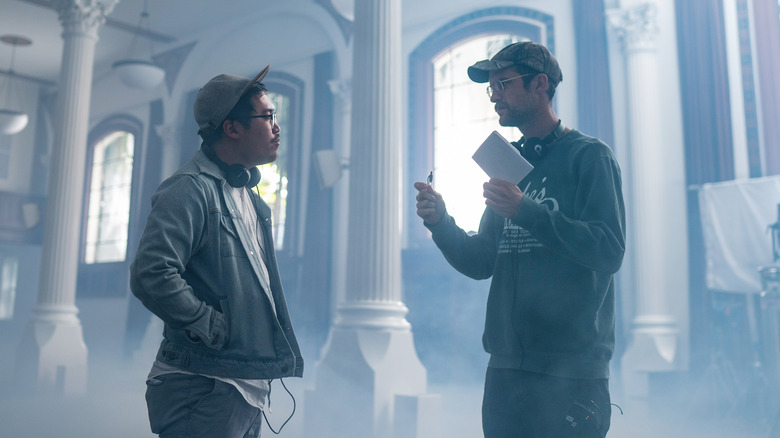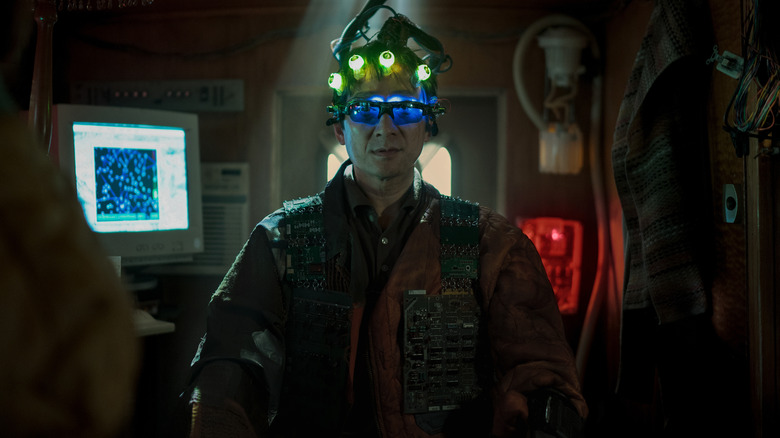Everything Everywhere Directors Daniels On Their Incredible Cast, Learning Action Filming And More - Exclusive Interview
You may not see another movie this year like "Everything Everywhere All at Once." Written and directed by Daniel Kwan and Daniel Scheinert, known professionally as Daniels, the film stars legendary action star Michelle Yeoh ("Crouching Tiger, Hidden Dragon") as Evelyn, a Chinese American woman trying to manage her unhappy husband Waymond (Ke Huy Quan), her depressed daughter Joy (Stephanie Hsu), and her struggling laundromat, while dealing with a tax audit and a hard-hearted IRS agent named Deirdre (Jamie Lee Curtis).
That's just the beginning of Evelyn's problems: She abruptly learns that she is one of infinite versions of herself all living in different universes, each on a different life path. As informed by an alternate version of Waymond, there is a growing menace in the multiverse that threatens to wipe out all of existence — and this version of Evelyn may be the only one who can stop it.
"Everything Everywhere" is Daniels' second feature film after 2016's "Swiss Army Man," which followed a long line of music videos and commercials. In addition to its larger scope and ambition, as well as its mind-bending premise, the new movie includes several firsts: the first time that two of the screen's most trailblazing women, Yeoh and Curtis, have worked together, and the first big screen role in 20 years for Ke Huy Quan, best known as Short Round in "Indiana Jones and the Temple of Doom" and Data in "The Goonies."
"Everything Everywhere" was produced by "Avengers: Endgame" directors Anthony and Joe Russo, who know a little about creating multiversal spectacles themselves. "Early on, we picked their brains about how they shot action on the scale they'd been doing," says Scheinert. "We learned that they did it a way that we don't want to do it." What they gleaned from the Russos and more is all covered in Looper's exclusive interview with Daniels.
How Daniels completely flipped the lead role of the movie
This was originally conceived with Jackie Chan as the lead and Awkwafina as the daughter. How might that have been a different movie and when did you realize that you could flip the lead's gender?
Daniel Kwan: It's worth noting that Michelle Yeoh was always...
Daniel Scheinert: ... one of the leads.
Kwan: Yeah, we always thought that it was going to be Jackie Chan and Michelle Yeoh, and actually Michelle was going to more or less play the Waymond character. She would have been the one doing the fanny pack fight. We felt like she could have killed it. That was the original idea, and then the movie, for a lot of different reasons — I think Jackie Chan is really hard to get to. He's very hard to access.
Scheinert: He's pretty expensive, we found out. We were thinking about who else is our next favorite martial artist, and it was Michelle Yeoh. We were like, "Maybe it should just be Michelle." Then we started talking about our moms, our aunts, and coming up with so much material that...
Kwan: ... We realized [this] was going to be way more personal of a film if we swapped those two roles.
Scheinert: And the screenplay, honestly, got a lot better. That was early days. That was literally the second big rewrite we did out of seven or eight. There's something about casting that can be so stressful, but we're so lucky that we've had this experience over the years. The right actors end up falling into the process where, if the material sparks to them, if their career's in the right place where this is the right project, the movie's that much better.
Kwan: Because our work is so specific, it pulls in specific people, which we're really lucky with. It becomes almost like a litmus test. If you want to do our project, then you're probably the right person for the project.
Scheinert: Yeah, like when we cast Stephanie Hsu, the character suddenly clicked in ways it never had before. Her audition was unhinged. We were like, "I think this villain could be unhinged." We started workshopping with her on brand new places to push the characters of Joy and Jobu. So it was a similar thing where it was like, "Oh my God, thank goodness that this movie was able to evolve as it went."
It seems like, if people had seen Jackie Chan, it would have seemed almost like, "Okay, I get where that's coming from." By flipping it around, it makes it a completely different thing that doesn't stick to the traditional expectations of what an action movie is.
Scheinert: Totally, which unlocked so much, thematically.
This actor came out of retirement to star in Everything Everywhere All at Once
How did Ke Huy Quan get involved? He had basically retired from acting for 20 years at this point. How did you get in touch with him and bring him on board?
Kwan: There's two parallel stories, and I'm realizing this is happening often whenever we reach out to people. At the same time, he reached out to his agent to be like, "I think I'm ready to go back into acting." He had just seen "Crazy Rich Asians" and he realized, "I need to be there. I'm missing out."
Scheinert: He's like, "There's good roles for people like me."
Kwan: So that happened. Parallel to that, we were, on our end, [getting] frustrated by the fact we couldn't find someone who was good at action, good at Cantonese, Mandarin and English, who could do drama, could do comedy, but who was also a true sweetheart, kind of a dopey character, just like the character we had written. We saw a picture of Short Round online and were like, "What's that guy up to?"
We did the math and we're like, "I think he's the right age." We reached out just as he was coming back in. When he first came into the audition, he's like, "Guys, I'm so excited. This is literally the first audition I've done in the States for decades. I'm going to be rusty, I'm sorry, but I'm just so excited about the script." He said he read it and he was like, "This character is made for me," and he was so right. After that first audition, we couldn't get him out of our heads because he's such a specific human being that worked perfectly for this role.
It's amazing that he would say he was rusty because you would never know it. He's so sensational in the movie.
Scheinert: Right from the get go, he was incredible, but he also put in so much work and it showed and he really took the project so seriously.
Kwan: Yeah, he put himself 100% into it. He reprioritized his whole life around this film. He hired a voice coach, a body movement coach, and an acting coach to remind himself how to do all these things, but also to step up to the fact that this movie required him to play multiple versions of himself and to be able to switch on a dime between those, within one performance — it's a very technical thing, and he knew that. To his credit, he put in the work, and it shows.
How Jamie Lee Curtis gave a very different performance in the movie
Jamie Lee Curtis said just recently that she physically, literally "let it all hang out" in doing the movie. Was that a conception of the character that you arrived at together with her?
Scheinert: Yeah, we were always excited that [the character of] Deirdre was an opportunity for an actress to play a character actor part. We were looking for someone who wanted to do something like that. Jamie immediately was excited to bringing in photo references of frumpy people and wanting to see photos of people who work in DMVs and IRS offices. She collaborated with us heavily on it and was like, "Hey, I never let it all hang out. I can do this." She would show off how she could poke her belly out.
I remember halfway through our career, one of the things people would talk about was, "What is a Daniels movie?" One of the things that started to define it for other people that, I thought it was really shocking, was that we put real people in the roles. If you go back and look at a lot of our short films, it looks like real people. You look at the music videos that we did for Lil John and DJ Snake — real people. That kind of representation has always been really important to Scheinert and me, and the fact that now, we get to do that [with someone] on the scale of Jamie Lee Curtis is really exciting. It lit her up. She was really enthusiastic about that.
What it's like to work with two legendary actresses
You have these two iconic actresses on the set. How are they different in their approach and preparation?
Scheinert: Jamie is like no one else we've ever worked with. She shows up hours before we need her there and she'll get in costume and start wandering the set, talking to background actors and crew members and ...
Kwan: I'd say Jamie is a student of life. That's the energy she brings to everything. She's always asking questions, always inquisitive, trying to figure out how things were work. That's a magical person to have on set, and then Michelle is more — she treats everyone and everything like potential family. Because she's always moving around the world, she has developed this really amazing skill to find family wherever she goes and really mean it. The fact that she still texts us sometimes and asks for pictures of my son — that's not an act, she's very much invested in people all around the world.
She brings that energy to set. Having these two icons come in with such beautiful, humbling mindsets really sets the stage.
Scheinert: Both of them are playful and they prepare, but they don't over-prepare. They're not crazy precious on the day if we throw a curve ball or are like, "Why don't we try it like that?"
Kwan: We definitely broke their brains a couple times on set.
Scheinert: Yeah, there are a few times where Michelle had a laughing fit.
Kwan: We had to take a break from shooting.
Scheinert: She was like, "What are we doing?"
What Daniels learned from the Russos
What kind of notes or input did you get from the Russo brothers?
Scheinert: Early on, we picked their brains about how they shot action on the scale they'd been doing. In a lot of ways, we learned that they did it a way that we don't want to do it. It was helpful to hear about how, on that scale, second unit directors and stunt coordinators take over a lot of it. There's a lot more supervising and dividing and conquering. Then, we spoke to them about how they shot "Arrested Development," and it sounded a lot more our speed. They had to be real economical and build sets that were right next to each other so that they could jump from thing to thing, because it was a pretty low budget show.
Kwan: Right, sometimes the set would be one wall, with a person in front of the wall. "Just how much can we get away with before people start to realize we're cheating?"
Scheinert: That was pretty valuable to pick their brains and then to try to invent a process that would work for us.
Kwan: Early on, we knew going into it, we were trying to destroy typical film structure and script structure. We purposely would deconstruct and destroy three-act structures and things like that. Sometimes, it was destroyed because we intentionally did that. Sometimes, it was destroyed because we just aren't that great. As writers, we're still pretty inexperienced.
Scheinert: They introduced us to ["Avengers: Endgame" screenwriters] [Christopher] Markus and [Stephen] McFeely, and we got to pick their brains early on, as well about some tips and tricks about structure, classic Hollywood screenwriting stuff, which was helpful.
Kwan: It's worth saying that we specifically wrote "Swiss Army Man" not knowing that stuff. We told ourselves, "We're not reading any books. We're going to write this thing and see what happens, and something pure will come out of it." With this one, we read all the [screenwriting] books. We were like, "Okay, we know this is going to be a very difficult alchemy or science that we have to figure out to thread that needle if we're going to destroy this movie and then bring it back out into something beautiful and unique that audiences will actually want to watch and share with their friends."
Everything Everywhere started as a mix of several classic movies
Before we go, what is your favorite movie of all time and why?
Scheinert: All time is "Eternal Sunshine of the Spotless Mind." It continues to mean something different when I watch it every five years or so, which is such a profound, lovely, relationship to have with the movie. As I get older and go through relationships, suddenly, what was romantic the first time I watched it becomes tragic and like, "Oh, look at all the red flags they're missing." And it's like, "Whoa, this movie has movies within it."
Kwan: That's a feat and easily one of my favorites. I'll say a tie between "Magnolia" and "Groundhog Day." Hopefully, self-explanatory. Both fantastic movies.
Scheinert: I re-watched "Magnolia" with my partner and afterwards she was like, "That's one of your favorite films?" I was like, "Yeah." I felt like she was seeing some of the darkness in me for the first time in a while. By me admitting that movie resonates so deeply, she was like, "Oh, wow." That movie is dark.
Kwan: There was a version of ["Everything Everywhere All at Once"] in which the first half is "The Matrix," and then the second half devolves into full-on "Magnolia." We tried so many versions of it and it was impossible. We couldn't make it work.
Scheinert: And then we were like, "Let's put some 'Groundhog Day' in there." And then maybe a little 'Eternal Sunshine.'"
Kwan: "Eternal Sunshine" was always in there, but yeah, the second half originally was going to be like, "You fully live in each of these universes," and we were intercutting between them like "Magnolia" or "Short Cuts" or "Nashville" or something. That's maybe for the sequel.
"Everything Everywhere All at Once" is now playing in select theaters.
